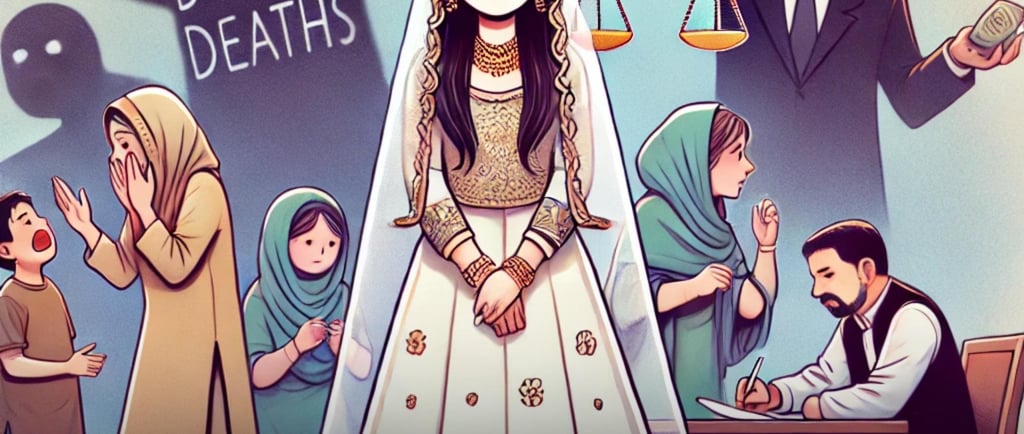Supreme Court Stresses Need for Rigorous Scrutiny in Bail Decisions for Dowry Death Cases
The Supreme Court has emphasized that courts must conduct a thorough examination of bail applications in dowry death cases to prevent trivializing a crime that continues to claim many innocent lives. It cautioned against mechanically granting bail in such cases, stating that doing so undermines the gravity of the offense and weakens public trust in the judiciary’s resolve to combat dowry-related crimes.
3/4/20253 min read


A Bench comprising Justices Vikram Nath and Sandeep Mehta observed that dowry deaths remain a serious societal issue, and courts must take their duty seriously when evaluating bail pleas in such cases. The Court stressed that a superficial application of bail parameters not only downplays the seriousness of these offenses but also erodes public confidence in the judicial system’s commitment to justice.
“It is unfortunate that even today, dowry deaths continue to be a major concern in our society. Courts must conduct an in-depth examination of the circumstances surrounding bail applications in these cases. Granting bail without proper scrutiny diminishes the seriousness of the crime and may create a perception that the judiciary is not committed to tackling this menace. It is essential to protect the integrity of justice, as failing to do so may result in normalizing a crime that continues to cause irreparable harm to innocent victims,” the Court stated in its order.
The Case of Shahida Bano
The Supreme Court was hearing an appeal against four bail orders issued by the Allahabad High Court in connection with the alleged dowry death of a young woman, Shahida Bano. The appeal challenged the High Court’s decision to grant bail to her in-laws, who were accused of playing an active role in the crime.
Shahida Bano was married to Sami Khan in February 2022. Soon after her marriage, her in-laws allegedly started making dowry demands. Initially, they insisted on a “Bullet” motorcycle, which Shahida’s family provided. However, they later demanded a car, which her family was unable to afford due to financial constraints. The prosecution argued that this led to continued harassment and mistreatment of Shahida by her in-laws.
In January 2024, Shahida’s father received a call from her father-in-law, asking him to come to her matrimonial home immediately. When the family arrived, they found Shahida’s lifeless body hanging from a ceiling fan with a dupatta.
A post-mortem examination conducted later that month revealed multiple ante-mortem injuries, including traumatic contusions on her head and neck. The cause of death was determined to be asphyxia due to ante-mortem strangulation, ruling out the possibility of suicide and strongly suggesting that she had been forcibly strangled.
Following her death, Shahida’s brother filed a complaint against her in-laws under Sections 498A (cruelty by husband or relatives of husband) and 304B (dowry death) of the Indian Penal Code, as well as Sections 3 and 4 of the Dowry Prohibition Act, 1961.
Allahabad High Court’s Bail Orders and Supreme Court’s Intervention
After the FIR was registered, the accused family members sought bail from the District and Sessions Court in Sultanpur. Their applications were rejected by the Sessions Judge. However, they later approached the Allahabad High Court, which granted them bail through separate orders. The High Court justified its decision by considering factors such as the absence of any prior criminal record, the fact that some of the accused were women, and the fact that co-accused individuals had already been granted bail.
Challenging these bail orders, the deceased’s family moved the Supreme Court, arguing that the High Court had overlooked critical evidence, including the post-mortem report, which clearly indicated that Shahida had been strangled.
Upon reviewing the case, the Supreme Court found a strong prima facie case against Shahida’s father-in-law and mother-in-law. The Bench observed that the evidence pointed to their direct involvement in making dowry demands, subjecting Shahida to physical abuse, and contributing to her death.
The Court expressed concern over the High Court’s seemingly mechanical approach in granting bail. While the High Court had considered the lack of prior criminal records, it had failed to take into account the gravity of the allegations and the serious circumstances of the case.
“We find that Accused No.2 and Accused No.3 do not deserve continued bail protection. The severity of the allegations, which range from persistent dowry demands to physical assault, presents a strong prima facie case against them. Allowing the father-in-law and mother-in-law to remain free would be inconsistent with the principles of justice, particularly when there is sufficient evidence linking their actions to the victim’s tragic death,” the Court noted.
Cancellation of Bail and Differentiation Among Accused
As a result, the Supreme Court canceled the bail granted to Shahida’s father-in-law and mother-in-law, directing them to surrender immediately. It held that their continued release would be unjustified in light of the serious allegations and the available evidence against them.
However, the Court took a different approach regarding the sisters-in-law of the deceased. It recognized that their involvement in the crime was less direct. Considering their personal circumstances—such as their marital status, education, and employment—the Court decided to uphold their bail. Nevertheless, it clarified that this decision should not be seen as an indication of their innocence or a judgment on the merits of the allegations against them.
Conclusion
The Supreme Court’s ruling underscores the necessity for courts to adopt a rigorous and cautious approach while granting bail in dowry death cases. By stressing the importance of deeper scrutiny, the Court has reinforced the gravity of dowry-related crimes and the judiciary’s role in ensuring justice for victims. This decision serves as a reminder that a mechanical approach to bail in such cases could weaken public faith in the legal system and contribute to the normalization of a deeply entrenched social evil.
